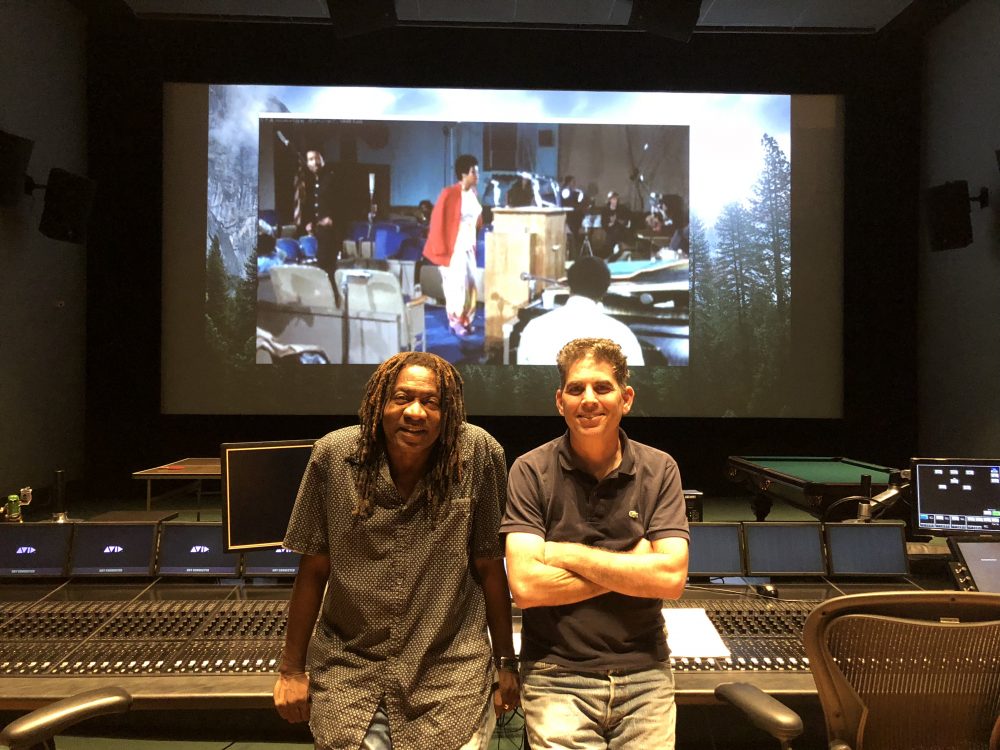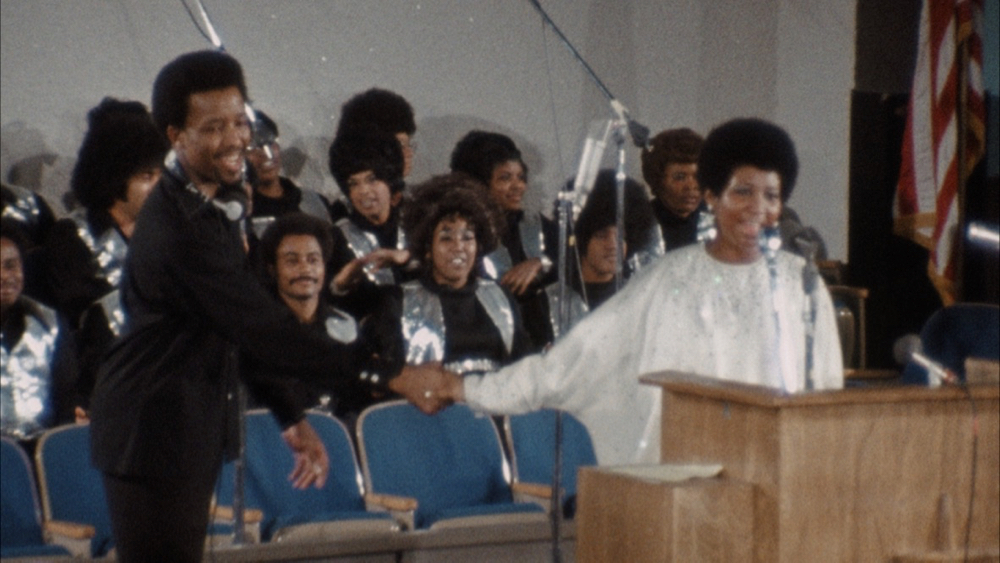Aretha Franklin Documentary ‘Amazing Grace’ Finally Getting Released After 46 Years (EXCLUSIVE)
By Chris Willman
LOS ANGELES (Variety.com) – Forty-six years after an Aretha Franklin gospel concert film was shot and abandoned, amazement is truly in order. The Franklin estate and producer Alan Elliott have reached an agreement to release the perpetually delayed “Amazing Grace” project, Variety can exclusively reveal. Although no distribution deal is yet in place for a planned general release in 2019, the film will premiere next Monday at the DOC NYC festival, followed by week-long Oscar-qualifying runs this month in Los Angeles and in December in New York.
“In recent weeks, Alan presented the film to the family at the African American Museum here, and we absolutely love it,” said Sabrina Owens, the late star’s niece and executor of her estate, in a phone interview from Detroit Sunday. “We can see Alan’s passion for the movie, and we are just as passionate about it. It’s in a very pure environment, very moving and inspirational, and it’s an opportunity for those individuals who had not experienced her in a gospel context to see how diverse her music is. We are so excited to be a part of this.”
The premiere is a very late addition to the long-since-announced DOC NYC festival; tickets for the Nov. 12 screening at the SVA Theatre go on sale this afternoon. “” is then set for a qualifying run at the Laemmle Monica Nov. 20-27, followed by a week at Manhattan’s Film Forum Dec. 7-14. Official premiere events for L.A. and Detroit are in the early stages of being planned for next year. The Franklin family and Elliott believe a distribution deal will come quickly but wanted to get the film ready for awards consideration first, then cross that bridge.
Very quietly, the film had already snuck onto the Oscars’ voting-member viewing site, and Elliott has been receiving calls of congratulation from Academy members who’ve streamed it there. The producer said he’d gotten advice from agents and prospective publicists that they should wait to put it out for another year, to allow time for a multi-million-dollar Oscar campaign — but he and Owens hope it will contend now, without that, as a word-of-mouth underdog, and not just in the documentary category but for best picture.
The film was originally scheduled to premiere at the Telluride and Toronto festivals in 2015, before Franklin’s lawyers were granted an injunction in court in Denver halting the showings. Her attorneys argued the singer had the right to deny the use of her likeness in the movie, while Elliott maintained that all rights had been granted when he bought the uncompleted footage from Warner Bros. Following the Telluride standoff, Elliott and Franklin’s team agreed to negotiate in good faith with the aim of making the singer a partner in the movie; as Variety reported , separate distribution deals with Lionsgate and Concord were on the table before talks stalled as Franklin grew more ill.
The legal wrangling created the appearance of enmity between camps, and the late singer was not always an easy read when it came to business matters. But in the midst of the imbroglio, Franklin told the Detroit Free Press that she “loved” the movie, a DVD edit of which Elliott had sent her years ago. The quality of the film itself was never at issue, as it straightforwardly documented what many Franklin buffs consider to be her greatest performance, a two-night stand of pure gospel music recorded with an ace band of Atlantic Records musicians and the Rev. James Cleveland’s choir at a South-Central L.A. church in January 1972 — as released in audio form later that year on what is still the bestselling gospel album of all time.
Elliott had been friends for years with Owens, who invited him to Franklin’s funeral in Detroit Aug. 31. Two weeks later, he went back to the Charles Wright African American Museum to screen the movie for Franklin’s family and their friends, who were all seeing it for the first time. The reaction there, they both say, was jubilant, with a feeling of urgency coming out of the screening about getting it before the public sooner rather than later.
“I think the movie stands by itself, so it would have a good run whether it’s next year or it was two or three years ago,” says Elliott. “But obviously, her singularity and her absence are really felt right now, so I think there is that energy toward rediscovering things that she did. And I feel that this performance is really her crowning achievement — and I think she felt that way too. As much as anything, I wish she had been here to be a part of it, especially since she said she loved the movie.”
Elliott hopes for a Detroit premiere in April, with plans to involve the Poor People’s Campaign and Clean Water for Flint on a charitable level. “Detroit is a powerful home base, I think, for ‘Amazing Grace’,” he says, “even though I think it’s a Los Angeles thing. too. We’ve been working with Superintendent Mark Ridley Thomas to get historical status for the New Missionary Baptist Church (where the album and film were made).”
The picture was locked for its would-be Telluride premiere three years ago, but late last week, Elliott was back in a Hollywood studio working on separate stereo and 5.1 mixes of the audio with Jimmy Douglass, a well-known engineer and mixer. Douglass is most renowned nowadays for his work on hip-hop albums like Jay-Z’s “4:44” and as Timbaland’s long-time right-hand man, but he started out in the early ‘70s working on rock, pop and R&B albums at Atlantic, where one of his first assignments was helping mix the “Amazing Grace” album.
Douglass worked on the movie, like a lot of participants, on his own dime a few years ago. Is he surprised to be working in 2018 on something he started in 1972? “I’m never surprised,” Douglass laughs, taking a break while Franklin’s perspiring image appears frozen above the mixing board. “Am I happy I’m working on it one more time? Of course I am. Always. Alan tracked me down years ago and showed up with this amazing project, and as far as I was concerned, I was the only person on the planet who should have my hands in it. There’s nobody else around who was as close to that whole school that’s actually still out there slaying the beast and still making hits that should be touching this. I was like, ‘That’s mine, I’m sorry.’ And here we are.”
Viewers might quibble over whether it’s technically a concert movie or a church service movie, but it’s foremost a music movie. “Aretha says six words in the movie,” Elliott points out. “She says, ‘What key is it, E?’ and then she says, ‘Water.’ So, obviously getting the music right is the thing we can do best by her legacy, I think.”
Douglass has worked on the movie over a period of about eight years. Elliott, considerably longer. “I’m really excited for people to get it because I think it is the premiere document of American popular music that was ever filmed,” says the producer, “and I could never figure out why we never got to see it. And it started 27 years ago when Jerry Wexler (the album’s late producer) said to me, ‘By the way, we filmed “Amazing Grace”.’ Twenty-seven years is a long time to wait to see a movie.”
Years before director Sydney Pollack’s death in 2008, he encouraged Elliott to buy and complete the footage he had shot in 1972; the filmmaker went to Warner Bros. and gave them his blessing to sell Elliott the film, which had languished in storage for decades after problems synching visuals and audio make it impossible to edit with the existing technology. The film is going out without a directorial credit, after years of debate about whether Pollack would want to be credited on a project he wasn’t able to see through after the initial shoot.
For Owens, the film “shows Aretha in a very different light. She’s very youthful, very shy, and her voice is just beautiful throughout, at an age when her voice was absolutely crystal-clear and very pure. It’s very moving and inspirational, and I enjoy it as a fan of the church and gospel music beyond just the fact that it’s my aunt singing. This just seems like the best time, because I think any time an artist passes, they’re fresh on people’s minds and hearts. But also, I think people want something in a very spiritual mode, and I think this is a feel-good movie that could be very uplifting in a time of turmoil in our country.”
Elliott adds an additional, slightly less philanthropic goal for what he’d like to see the movie accomplish. “Aretha always wanted to be a movie star, and we feel this is her chance to be a movie star,” he says. “No, she is a movie star.”
RELATED VIDEO:


